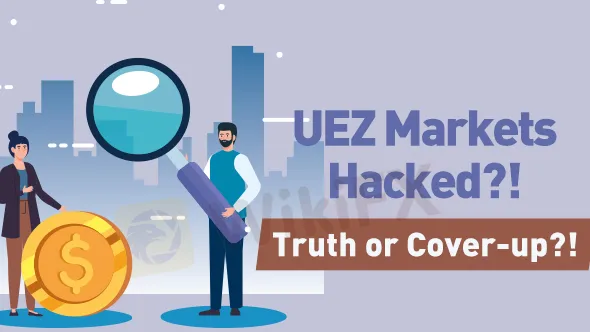简体中文
繁體中文
English
Pусский
日本語
ภาษาไทย
Tiếng Việt
Bahasa Indonesia
Español
हिन्दी
Filippiiniläinen
Français
Deutsch
Português
Türkçe
한국어
العربية
UEZ Markets Hacked?! Truth or Cover-up?!
Abstract:Did UEZ Markets really get hacked or is this just an excuse for the company to withhold traders’ funds for an indefinite period of time?!

In the dynamic world of online trading, the choice of a broker can make or break a trader's experience.
Founded in 2020 within the confines of the Cayman Islands, UEZ Markets offers various financial instruments and services, including forex trading, CFD trading, stocks, and commodities. Despite its promise and allure, the broker's regulatory status has come into question, casting a shadow over its operations.

The official website of UEZ Markets, accessible at https://uezmarkets.com/, claims that the broker is regulated by two reputable authorities: Australia‘s ASIC and the United States’ NFA. However, a meticulous investigation by WikiFX has revealed a starkly different narrative. UEZ Markets has earned an abysmally low WikiFX score, further eroding confidence in its reputation and ethical standing.

WikiFX, renowned for its in-depth evaluation of brokers, is pivotal in guiding traders toward informed decisions. A broker's WikiFX score reflects compliance with industry standards, regulatory oversight, and overall client satisfaction. The dissonance between UEZ Markets' alleged regulatory affiliations and its subpar WikiFX score raises alarm bells, leaving traders questioning the legitimacy of the broker's claims.
Adding to the scepticism, a disgruntled user recently voiced his concerns regarding his experience with UEZ Markets. Having initially invested $2000 into his trading account, his anxieties deepened when he attempted to initiate a withdrawal and found himself unable to do so. The situation left him in a state of panic, questioning the reliability of the broker he had entrusted with his funds.

UEZ Markets provided an explanation that raises even more doubts. The broker claimed that its system had fallen victim to hacking, resulting in erroneous figures on its platform, including investment amounts and trades. The puzzling revelation that a substantial trade had been liquidated, as per MT5 records, only fueled suspicions. The lack of solid evidence to corroborate such a significant event and the absence of contingency measures like backup servers has left traders questioning the integrity of UEZ Markets' explanation.

In conclusion, UEZ Markets' unregulated status and low WikiFX score have overshadowed its credibility within the online trading community. The discrepancy between its claimed regulatory oversight and the reality of its WikiFX score underscores the importance of rigorous due diligence for traders. This victim's unfortunate experience serves as a stark reminder that choosing a broker demands careful consideration, and traders must remain vigilant to safeguard their investments in the tumultuous landscape of online trading.

Disclaimer:
The views in this article only represent the author's personal views, and do not constitute investment advice on this platform. This platform does not guarantee the accuracy, completeness and timeliness of the information in the article, and will not be liable for any loss caused by the use of or reliance on the information in the article.
Read more

Young Adults Vulnerable to Phishing Scams Despite Being "Digital Natives"
Young adults, often called "digital natives," are surprisingly vulnerable to phishing scams due to impulsive social media habits, studies reveal.

Robinhood Launches Prediction Markets Hub for Trading Events
Robinhood introduces prediction markets for events like the Fed rate and sports, partnering with Kalshi for regulated U.S. access to futures trading.

U.S. Stocks Bounce Back for Two Consecutive Days, Is a Positive Outlook Ahead?
The U.S. stock market has rebounded for two consecutive days. Could this signal a potential turning point, or is it just a temporary uptick? Let's explore the market movements, their underlying causes, and how investors should respond.

U.S. Consumer Weakness: Is It Good or Bad?
U.S. retail data for February came in below expectations, raising concerns about slowing consumer spending. Does this signal the beginning of an economic slowdown, or is it just a temporary fluctuation? Let's dive into the analysis.
WikiFX Broker
Latest News
Beware: Forex Investment Fraud Targeting Low Income Earners
Central Bank Policies,Forex Markets and Gold Prices
These 24 Crypto Scams Are Accelerating the Theft of Your Assets
49 Foreigners Arrested in Illegal POGO Raid in Pasay City
Beware of Fake 'Educational Foundations' Targeting Crypto Investors, Warns North Dakota Regulator
We Asked Grok About Illegal FX Brokers—Here’s What It Revealed
Exposing Trading Academy Scams: How Aspiring Traders are at Risk
Online Investment Scams on the Rise: How Two Victims Lost Over RM100K
Vanished Savings: How One Woman Lost RM412,443 to an Online Scam
Investor Alert: FCA Exposes 9 Unregistered Financial Companies
Currency Calculator






